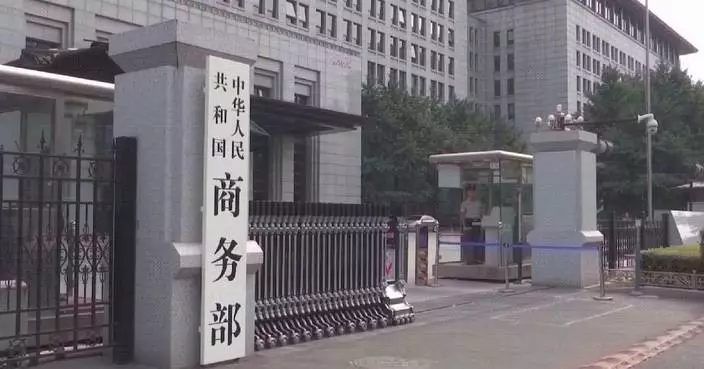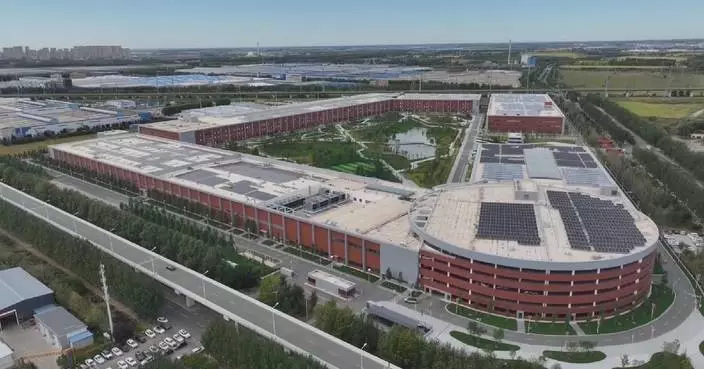Large-scale anti-war rallies were held across Germany from Saturday to Sunday to protest the government's military involvement in the Russia-Ukraine conflict.
Protesters gathered to voice their opposition to the government's military and diplomatic policies and called for a peaceful solution to the ongoing Russia-Ukraine conflict.
Germany's economy has weakened and inflation has surged in recent years due to the spillover effects of the conflict, deepening public dissatisfaction. Many Germans are increasingly opposed to their government's further military involvement in the conflict.
On Saturday, hundreds of demonstrators from across the country gathered in downtown Dusseldorf, the capital city of North Rhine-Westphalia, the most populous state of Germany. They waved anti-war banners and chanted slogans, calling for peace.
The rally was more than just an anti-war demonstration. It was also a broader appeal to the international community, urging the world leaders to resolve conflicts through dialogue and diplomacy.
"We want peaceful [and] good relations with all our neighbors in Europe and all in the world. And also Russia, I think, it's part of Europe as well. And also we want good Eurasian relations, but this government kind of ended all diplomatic activities. It's really a shame. What they are doing with their weapon deliveries to Ukraine to put more oil in the fire," said Isabelle Casel, a protester.
Since the conflict began, Germany has continued to supply weapons to Ukraine, making it Ukraine's second-largest arms supplier after the United States. The ongoing escalation of the conflict has left many anti-war activists fear that it could lead to broader risks.
At the NATO summit in July, the German government announced that the United States would begin deploying the long-range fires capabilities of its Multi-Domain Task Force in Germany in 2026, sparking widespread unease across the country.
"Long-reach missiles on German soil will further escalate the conflict with Russia and will make Germany a target for Russian bombs in case this war with Russia escalates even further," said Mona Aranea, another protester.

Protests held across Germany against gov't involvement in Russia-Ukraine conflict

Protests held across Germany against gov't involvement in Russia-Ukraine conflict
Many Singaporeans support raising the re-employment age, partly to stay busy and active in retirement, and to help address demographic challenges in the workforce.
Like many other Asian countries, Singapore is grappling with a rapidly aging population. The government predicts that by 2030, one in four Singaporeans will be aged 65 or older, up from one in 10 two decades ago.
A survey on retirement and employment conducted last year in the country found broad support for raising the national retirement age, with about 88 percent of those aged 50 and above in favor.
Some supported increasing the retirement age because continuing to do what they love, rather than retiring, keeps them feeling youthful and fulfilled.
When Nancy Hor, a retired IT operations manager, left her job five years ago, she wasn't sure how to fill her time.
"I'm a workaholic. At the very first stage after I retired, I felt I could not find balance," she said.
Hor, now 70, said it took her some time to adjust. In her spare time, she stays busy line dancing and spending time with her family.
But she said that if she had had the choice, she would have liked to stay employed a little longer.
"I think it's good for the elderly that even they have some job to do, and keep them busy," said Hor.
In March, authorities announced plans to raise the retirement age to 64 and the re-employment age to 69 by 2026.
Singapore's Minister of State for Manpower, Gan Siow Huang, said the changes to the rules protect senior workers from dismissal due to age-related issues before they reach the statutory retirement age. Employers are also required to offer re-employment to eligible workers until they reach the statutory re-employment age limit.
This follows a similar move made two years ago to raise the retirement and re-employment ages to 63 and 68, respectively. The city-state is also aiming for a retirement age of 65 and a re-employment age of 70 by 2030.
"That is to reduce the impact on businesses, so it gives time for businesses to adapt their policy. This gradual increase in retirement age basically provides a framework for individuals like myself, who want to continue to be gainfully employed," said Patrick Chang, a retirement planning specialist and the author of the A to Z guide to retirement planning.
Chang said that businesses will need to make adjustments to accommodate the changes, including offering retraining for senior workers.
He noted that the changes won't impact those who still wish to retire earlier, but given Singapore's demographic challenges, the country cannot afford to remain idle.
"If we don't do it now, the social cost could be high. We cannot wait until the time when we need it today, and then we get something done. It will probably be a bit too late, and the cost of getting to that solution will be higher," said Chang.

Many Singaporeans support raising retirement, re-employment ages











